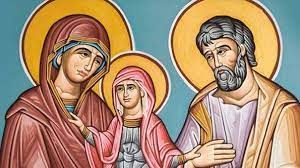HOMILY – FEAST of ST JOACHIM AND ANNE
The First Holy Family
(Sir 44:1, 8, 10-15; Ps 132; Mt 13:16-17)
**********************************************
Today we celebrate the feast of St. Joachim and St. Anne, the parents of our mother Mary, and the grandparents of Jesus. The gospels are bereft of details regarding them – not even offering their names. What we do know comes from writings excluded from the canon of Scripture, in particular the Proto-gospel of James. Nevertheless, the cult of St Anne existed in the 6th century in the Church of Constantinople and early in the 8th century in Rome. In the 13th and 14th centuries, popular devotion to Anne increased, as seen by the number of churches bearing her name. At the request of some English bishops petitioned by parishioners, Pope Urban VI made her feast an annual celebration. Joachim has been honoured in the East from earliest days, but in the West only since the 16th century. Their names were entered into the Roman calendar in 1584.

Sts. Joachim & Anne
Tradition tells us they were a saintly couple, providing a warm, loving home for their child Mary who was immaculately conceived. It was in their home that the angel Gabriel appeared to Mary to inform her that she would be the mother of the Savior of the world, and in which Mary gave her faith-filled “Yes” or “Fiat.”
Their marriage and family life is a much-needed reminder of the importance of healthy, loving homes for our children to grow up in. In a sense, theirs could be called the first Holy Family, and should be an invitation to all of us to strive to emulate their virtues of love, warmth, caring and faith. The loving gaze of a mother and father upon their little child begins to instill a sense of worth, esteem, belonging and being loved that sets the stage for a life of wellbeing.
The family of Joachim and Anne was an icon of the first primal family – the Trinity. Franciscan spiritual writer and speaker, Fr. Richard Rohr, has done us all a favor with his book, The Divine Dance, in which he describes the Trinity as a perichoresis, three persons in a dynamic relationship of love – the Father loving the Son, the Son loving the Spirit, and the Spirit returning that love to the Father. For him, God is relationship, intimacy, family. The Spirit is given to us to heal our families to resemble that of the Trinity, as did the family of Joachim and Anne.
There is no perfect family, so all our families need some healing, to a greater or lesser degree. After both his parents died, Robert invited his siblings to the family farm for a family retreat. First, they caught up on each other’s activities over the years when they had been out of touch. Then they did some family imagery. For some their family was like canoes drifting on a stream, sometimes bumping into each other. For another they were like a wagon wheel with spokes going off in different directions, with no rim to hold it all together. For another, they were like a broken pottery vase that they were trying to put back together. They did some forgiving and hugging, celebrated the Eucharist, and finished with a family meal. It was a rich, healing experience for all. In that one day, their family became much more like the Trinity, and the family of Joachim and Anne.
Jesus, in the gospel, proclaims that his disciples are blessed because they see and hear what their ancestors longed to see and hear, but did not see or hear it. There are many people in our day who also have eyes, but still do not see Christ in the people and situations around them. There are many people today who have ears, but still have not really heard and taken to heart the message of Jesus, nor do they understand it.
The first reading from Sirach extols the virtues of the ancestors, and invites us to be grateful for the gift of faith that has been passed on to us. We, their descendants, are to stand by the covenants involving us in an intimate relationship with God as Trinitarian family. We can be grateful for the gift that is given to us as disciples who see and hear what others longed to see and hear, for the unconditional covenant with Jesus is the fulfillment of all prophecy and law.
The Eucharist is an intimate meal with our God who has invited us into a covenant relationship with God’s self, so let us be grateful for the gift of faith in the unconditional love of God, and like the disciples, share that love of God with the world.



